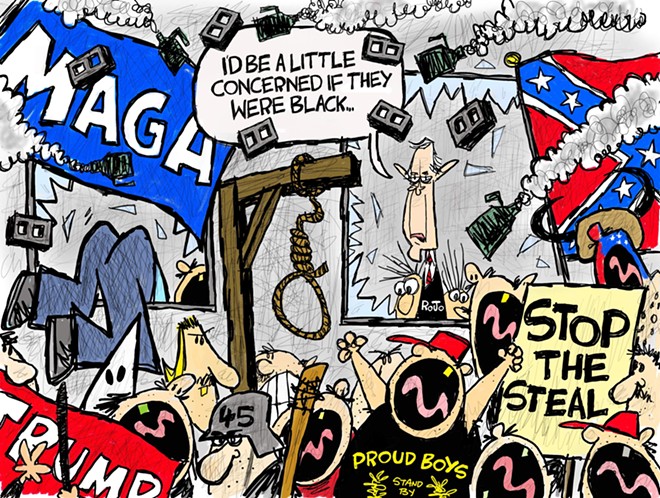On Friday afternoon, facing seven allegations of sexual assault or harassment — not to mention an ongoing investigation into his cover-up of nursing home COVID deaths — New York Gov. Andrew Cuomo told reporters that congressional and legislative Democrats’ calls for him to resign were part of (wait for it) “cancel culture.” Then he added, with a straight face, that “part of this is that I’m not part of the political club. And you know what? I’m proud of it.”
Cuomo is a three-term governor of America’s fourth-largest state, and the son of a three-term governor. If he’s not part of the political club, the club does not exist.
Surely, I thought, this was the whiniest, most risibly stupid thing a politician has said since Donald Trump retreated to Mar-a-Lago. As it turns out, it wasn’t even the whiniest, most risibly stupid thing a politician had said in the previous 48 hours.
That morning, Sen. Marco Rubio published an op-ed in USA Today aligning with unionizing Amazon workers in Alabama. Not because he likes unions, but because Amazon is woke.
“For the past several years,” Rubio began, “Amazon has waged a war against working-class values. The Silicon Valley titan uses anticompetitive strategies to crush small businesses, bans conservative books, and blocks traditional charities from participating in its AmazonSmile program.”
To translate from charlatan: Amazon has refused to sell books from anti-LGBTQ quacks and provide fundraising platforms for hate groups, and reading books by anti-LGBTQ quacks and raising money for hate groups are working-class values.
Rubio continued: “Republicans have rightly understood the dangers posed by the unchecked influence of labor unions. … But the days of conservatives being taken for granted by the business community are over. Here’s my standard: When the conflict is between working Americans and a company whose leadership has decided to wage [a] culture war against working-class values, the choice is easy — I support the workers.”
Again, translating from charlatan: Unions are bad, except when companies won’t host right-wing social media platforms whose users are openly plotting to kill and rape politicians.
As vapid as he is, Rubio had competition from two Senate colleagues. The first was Sen. Thom Tillis, who, in opposing the For the People Act’s requirement that dark money groups disclose their donors, coughed up this gem of critical thinking: “[Democrats] simply found another way to do exactly the same thing — people providing money to candidates and influencing elections. They’ve just come up with a more sophisticated, broad-based policy that I doubt very seriously that they’d be willing to abandon.”
Tillis was equating ActBlue, which collects small-dollar donations on behalf of Democratic candidates, to the super PACs that spent millions on his behalf last year. The difference: ActBlue reports its donations to the FEC. Dark money groups do not.
Then there’s Sen. Ron Johnson of Wisconsin, who’s spent the last few months spreading conspiracy theories about election fraud and the Jan. 6 Capitol riots being the work of antifa. RonAnon told a radio interviewer that he wasn’t worried during the insurrection because “I knew those were people that loved this country, that truly respect law enforcement, would never do anything to break a law, and so I wasn’t concerned.” (They killed a cop.)
“Had the tables been turned and President Trump won the election and those were tens of thousands of Black Lives Matter and antifa protesters,” Johnson added, “I might have been a little concerned.”
Switching from gross racism to gross pleas for attention: The day after President Biden’s primetime address, Florida Gov. Ron DeSantis tried to position himself as Biden’s antagonist.
“You know I was watching this speech last night about saying, ‘Oh, well, we may have to impose lockdown restrictions again.’ Biden said that. Let me just tell you, there’s no lockdowns in Florida, OK. We’re not going to let anyone close schools, we’re not going to let anyone take your jobs, we’re not going to let anyone close your businesses.”
Except Biden didn’t say that. What he said was, “Unity is what we do together as fellow Americans, because if we don’t stay vigilant and the conditions change, then we may have to reinstate restrictions to get back on track. And please, we don’t want to do that again.”
In other words, Ron, if we behave recklessly to score cheap political points — like, say, waiving local governments’ fines for violating COVID restrictions, thus signaling that all rules are off, even as communities of color are unable to access vaccines that all seem to end up in your supporters’ arms — things could get very bad again, and we’d have to respond accordingly. In the meantime, stop punching straw men.
But even this wasn’t the most asinine comment of the week. That prize goes to Arizona state Rep. John Kavanagh, who did us all a favor by saying the quiet part out loud.
On Wednesday, Kavanagh, the chairman of the Government and Elections Committee, defended his party’s attacks on voting rights as follows: “There’s a fundamental difference between Democrats and Republicans. Democrats value as many people as possible voting, and they’re willing to risk fraud. Republicans are more concerned about fraud, so we don’t mind putting security measures in that won’t let everybody vote — but everybody shouldn’t be voting.”
He said this after acknowledging that the evidence for election fraud was “anecdotal.” Then again, as Kavanagh made clear, that’s not the point. “Quantity is important,” he said, “but we have to look at the quality of votes, as well.”
Which is to say, it’s more important to fix a nonexistent problem than to encourage “inferior” people to vote.
In a week full of bad arguments from awful men, Kavanagh’s was the worst — though he’s not exactly on the fringe. Across the country, Republicans have introduced more than 250 bills that restrict voting, all rooted in the belief that not everyone deserves to vote because some voters are of lesser quality.
Get Informed Dissent delivered straight to your inbox. Subscribe at billman.substack.com.


